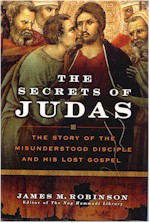 |
|
|
| ||||||
|
|
This page is the original source of this review, though you may also find it on Amazon or other sites. | ||
| Book Reviews Home | Free Audio Books | |
 |
Book Review of: The Secrets of JudasWe recommend The Secrets of Judas List Price: $19.95 |
| Review
of The Secrets of Judas, by Dr. James M. Robinson Reviewer: Mark Lamendola Dr. Robinson probes a long-held belief that probably isn't true. He begins by looking at Judas Iscariot in light of the New Testament, and he shows that the idea of Judas as traitor conflicts with the Gospel accounts. This shows an inconsistency between dogma and Scripture. But, he doesn't stop there. Dr. Robinson does the same analysis from secular history, resulting in a fascinating and convincing case in defense of Judas. Then, Dr. Robinson looks at a third resource: The Gospel of Judas. Once he introduces this document, he devotes the rest of the book to discussing it and its implications. And what implications there are! Scholarly pursuits, especially history and archeology, strike most outsiders as dull. But Dr. Robinson's account of the cloak and dagger world of obtaining rare historical documents from shadowy sellers would have made for a good Bogart film. Indeed, I kept thinking of the Maltese Falcon while reading much of this book. So, it's entertaining as well as informative and thought-provoking. Unfortunately, there's a potential fly in the proverbial ointment here. It's easy to get the impression that Dr. Robinson is perpetuating a particular Catholic teaching that fundamentally violates any serious reading of the Bible. This is the claim that Jesus was referring to Peter as the "rock" on which he would "build my church." To accept this view, you must take the exchange completely out of context, ignore all that preceded and followed the exchange (including when the so-called "rock" denied Christ three times), and stretch logic like a rubber band. This is exactly what Roman bishops did in the Fourth Century to consolidate power in Rome and create the doctrine of a succession of popes going back to Peter. I contacted Dr. Robinson through his publicist, and found that he is not at all perpetuating this teaching. He flatly stated that, and he related other facts to support his real position on the matter. So, any such impression was not intended by Dr. Robinson.
The reader can rest assured that this book is authoritative. Not only is it internally consistent, but it is also consistent with the current literature produced by Dr. Robinson's contemporaries in this particular discipline of historical studies. In addition to being well-written in this age of pidgin English publications, this book was enlightening. It was worth the list price--definitely a good read. If you like books that are good conversation starters, put this book on your list. But also put it on your list if you want greater insight into today's Western religious traditions--especially one that holds Judas Iscariot to be a traitor. This tradition may be one of the greatest cases of libelous fraud ever perpetuated. There's a reason for that fraud. Read this book to discover what it is. | |
About these reviewsYou may be wondering why the reviews here are any different from the hundreds of "reviews" posted online. Notice the quotation marks? I've been reviewing books for sites like Amazon for many years now, and it dismays me that Amazon found it necessary to post a minimum word count for reviews. It further dismays me that it's only 20 words. If that's all you have to say about a book, why bother? And why waste everyone else's time with such drivel? As a reader of such reviews, I feel like I am being told that I do not matter. The flippancy of people who write these terse "reviews" is insulting to the authors also, I would suspect. This sound bite blathering taking the place of any actual communication is increasingly a problem in our mindless, blog-posting Webosphere. Sadly, Google rewards such pointlessness as "content" so we just get more if this inanity. My reviews, contrary to current (non) standards, actually tell you about the book. I always got an "A" on a book review I did as a kid (that's how I remember it anyhow, and it's my story so I'm sticking to it). A book review contains certain elements and has a logical structure. It informs the reader about the book. A book review may also tell the reader whether the reviewer liked it, but revealing a reviewer's personal taste is not necessary for an informative book review. About your reviewer
About reading styleNo, I do not "speed read" through these. That said, I do read at a fast rate. But, in contrast to speed reading, I read everything when I read a book for review. Speed reading is a specialized type of reading that requires skipping text as you go. Using this technique, I've been able to consistently "max out" a speed reading machine at 2080 words per minute with 80% comprehension. This method is great if you are out to show how fast you can read. But I didn't use it in graduate school and I don't use it now. I think it takes the joy out of reading, and that pleasure is a big part of why I read. |
| |||||